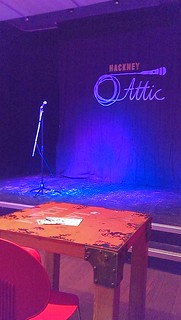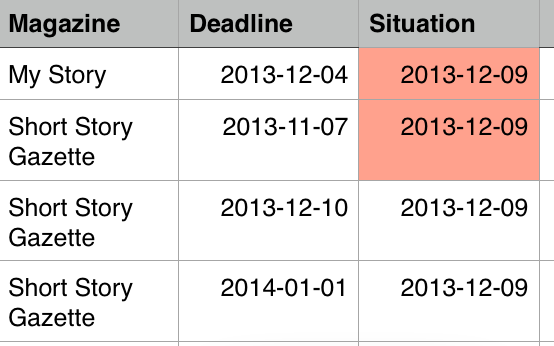A short while ago I published an article called 5 reasons for using Scrivener for writing books.
I wondered: could Scrivener be used to write blog articles?
A short while ago I published an article called 5 reasons for using Scrivener for writing books.
I wondered: could Scrivener be used to write blog articles?
 I love second-hand bookshops. Whenever I go on holiday, one of the first things I do is go to the nearest Tourism Information outlet and get a list of the local used bookshops.
I love second-hand bookshops. Whenever I go on holiday, one of the first things I do is go to the nearest Tourism Information outlet and get a list of the local used bookshops.
So, what do I like about them, and what does this have to do with ebooks?
 It can be quite hard coming up with ideas for making your blog work for you. By that I mean help you generate traffic to your blog, help you to establish yourself as the go-to person in your niche, or how to generate income from your blog (whether directly or indirectly). However, I recently came across a blog post that suggests 90 ways to “make your blog rock”. It’s pretty good.
It can be quite hard coming up with ideas for making your blog work for you. By that I mean help you generate traffic to your blog, help you to establish yourself as the go-to person in your niche, or how to generate income from your blog (whether directly or indirectly). However, I recently came across a blog post that suggests 90 ways to “make your blog rock”. It’s pretty good.![]() I'm in the process of collating top tips and resources about designing ebook covers. I've compiled a list of useful links (see below), which I'm adding to continually, but if you have any advice based on experience it would be interesting to hear about it.
I'm in the process of collating top tips and resources about designing ebook covers. I've compiled a list of useful links (see below), which I'm adding to continually, but if you have any advice based on experience it would be interesting to hear about it.
 The only thing wrong with Spark London is that it is confined to London, which is only to be expected of course! However, the good news for people who like the idea of story-telling as a way to improve their writing (see 4 ways that Spark London is good for writers) is that there are story-telling clubs and events all over Britain.
The only thing wrong with Spark London is that it is confined to London, which is only to be expected of course! However, the good news for people who like the idea of story-telling as a way to improve their writing (see 4 ways that Spark London is good for writers) is that there are story-telling clubs and events all over Britain. If you listen to blues songs, you will discover that amongst the angst, the stories of “my baby done packed her suitcase and caught the midnight train” (they must have amazing rail services in the USA because all the trains seem to depart at midnight), and being down and out, there are some real glimpses of a deeper Truth, with a capital “T”.
If you listen to blues songs, you will discover that amongst the angst, the stories of “my baby done packed her suitcase and caught the midnight train” (they must have amazing rail services in the USA because all the trains seem to depart at midnight), and being down and out, there are some real glimpses of a deeper Truth, with a capital “T”. Remember typewriters? One of the things I used to try and do was to make pictures by typing the letter “X” over and over again in all the right places. For example, one of the images it was possible to create in this way was a Christmas tree. OK, so it wasn’t the most exciting thing in the world, but at least it kept me off the streets.
Remember typewriters? One of the things I used to try and do was to make pictures by typing the letter “X” over and over again in all the right places. For example, one of the images it was possible to create in this way was a Christmas tree. OK, so it wasn’t the most exciting thing in the world, but at least it kept me off the streets. The good news for those of us who prefer just to write than to be multimedia producers is that consumers in the UK have shown a marked lack of interest in so-called “enhanced” ebooks.
The good news for those of us who prefer just to write than to be multimedia producers is that consumers in the UK have shown a marked lack of interest in so-called “enhanced” ebooks.I’ve been prompted to ask this question because I recently picked up, in a second-hand bookshop, a book called “No plot? No problem!”. The author is Chris Baty, who started the "Write a novel in a month” competition, otherwise known as “Nanowrimo”.
I haven’t read very much of it yet, but from what I have read I’m impressed.
 The biggest problem facing the would-be writer is getting commissions. I think we all know what it’s like to receive rejection slips. Some of us could even paper our walls with them. The second biggest problem is how to organise yourself to not miss a deadline once you do start to get commissions. The best way, I’ve found, is to use a spreadsheet.
The biggest problem facing the would-be writer is getting commissions. I think we all know what it’s like to receive rejection slips. Some of us could even paper our walls with them. The second biggest problem is how to organise yourself to not miss a deadline once you do start to get commissions. The best way, I’ve found, is to use a spreadsheet. I always try to follow my intuition. Thus it was that a couple of weeks ago, with deadlines pressing on me, and pressure from all sides, I decided to ignore my intellectual protestations and listen to my inner voice.
I always try to follow my intuition. Thus it was that a couple of weeks ago, with deadlines pressing on me, and pressure from all sides, I decided to ignore my intellectual protestations and listen to my inner voice.
That voice whispered to me:
You haven’t looked at The Atlantic for a while, have you? Go check it out.”
So I did, and I came across an interview with a writer I’d never heard of, Sherman Alexie.
Alexie is a Native American writer, which is why I suppose I’d never come across his work. Interestingly, he refers to himself as “Indian”, which we are told is politically incorrect. I think I’d rather take Alexie’s word for that. But anyway….
 There is a “law”:
There is a “law”:
Ninety-nine Rule of Project Schedules
The first ninety percent of the task takes ninety percent of the time, the last ten percent takes the other ninety percent.
I never really understood this in the context of “projects” as normally understood. But in the context of a writing project or assignment, it makes perfect sense.
 It is almost a year since I suggested 7 reasons writers should blog. I’ve recently discovered another one.
It is almost a year since I suggested 7 reasons writers should blog. I’ve recently discovered another one. How do you know if you are, objectively speaking, a success as a writer?
How do you know if you are, objectively speaking, a success as a writer?
Although I may be accused of taking too simplistic an approach to this question, I really do think that it comes down to just one thing.
Well, in practice, of course, there are many potential indications of success. For example, people telling you they like what you write. People asking when your next book is coming out. That sort of thing.
However, nice as such accolades are, they don’t pay the rent, and talk is, or can be, cheap.